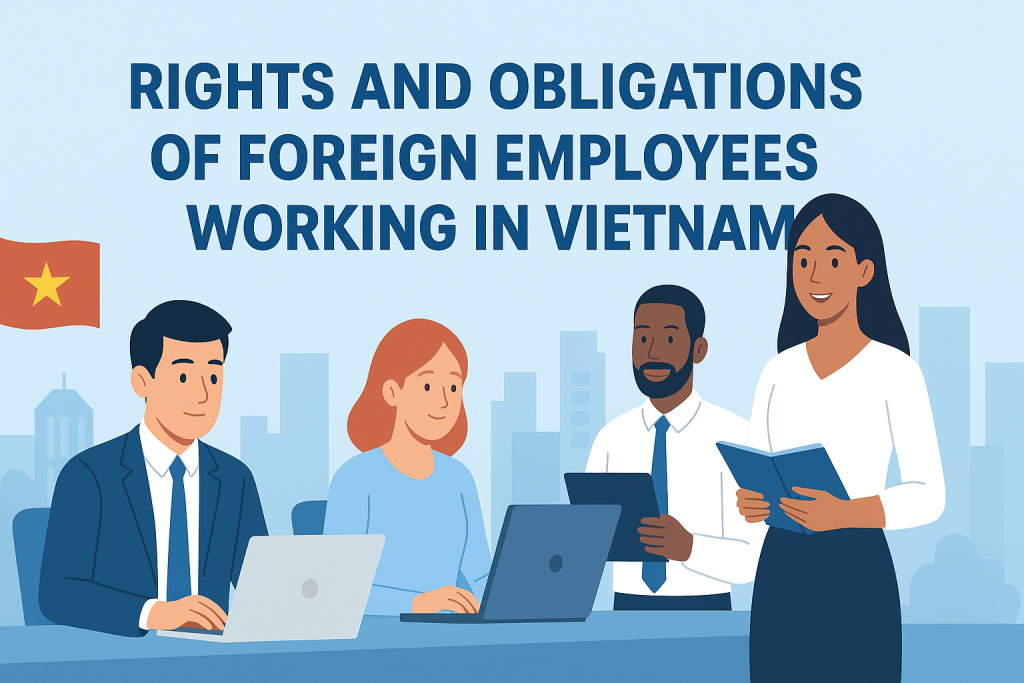
In the context of globalization, Vietnam has become an attractive destination for foreign employees in industries such as manufacturing, information technology, finance and banking, and corporate management.
To ensure that employment relationships are established and implemented in compliance with the law, the 2019 Labor Code and relevant legal instruments clearly define the rights, obligations, and responsibilities of foreign employees working in Vietnam.
This bulletin highlights the key rights and obligations of foreign employees under the current legal framework, with a particular focus on wages, occupational safety, leave entitlement, social and health insurance, and labor discipline.
1. Rights Regarding Wages and Benefits
Under Article 90 of the 2019 Labor Code, wages refer to the amount paid by the employer to the employee for performing work as agreed, including base salary, allowances, and other supplementary payments.
Foreign employees working in Vietnam are entitled to:
- Receive wages not lower than the region-based minimum wage announced annually by the Government;
- Be paid directly, in full, and on time;
- Agree upon the currency of payment (Vietnamese dong or foreign currency) in accordance with lawful contracts;
- Receive overtime pay, night shift pay, and bonuses based on work performance or business results;
- Upon contract termination, receive full payment of wages, allowances, and other entitlements within the statutory timeframe.
Employers who pay below the minimum wage, delay payment, or make unlawful deductions are in violation of labor law and may be administratively sanctioned under Decree No. 12/2022/NĐ-CP.
2. Occupational Safety and Hygiene
Article 134 of the 2019 Labor Code affirms that all employees, including foreign workers, are entitled to safe and hygienic working conditions that protect their health and lives.
Specifically:
- Employers must assess and control hazardous and harmful factors and implement technical measures to ensure safety.
- Before commencing work, foreign employees must undergo occupational safety and hygiene training (Article 14 of the 2015 Law on Occupational Safety and Hygiene).
- In the event of a work accident or occupational disease, employees are entitled to compensation or allowances (Articles 38–41 of the 2015 Law on Occupational Safety and Hygiene).
- Employees have the right to refuse to work when there is an obvious threat to life or health, and may not be disciplined in legitimate cases (Article 138 of the 2019 Labor Code).
Employers utilizing foreign labor must also prepare risk management files and periodically report on occupational accidents and diseases to labor authorities.
3. Working Hours, Leave, and Holidays
Under Chapter VII (Articles 105–115) of the 2019 Labor Code, foreign employees enjoy the same working time, rest periods, and leave entitlements as Vietnamese workers.
- Working hours:
- Not exceeding 8 hours per day or 48 hours per week;
- Overtime work requires consent and must not exceed 40 hours per month and 200 hours per year (or 300 hours in specific cases).
- Weekly rest and holidays:
- At least 24 consecutive hours of rest per week;
- Entitled to Vietnam’s public holidays and one additional day off for the employee’s traditional New Year, according to their home country.
- Annual leave:
- At least 12 paid leave days per year, increasing by one day every five years of service;
- Unused annual leave days must be compensated upon contract termination.
4. Participation in Social and Health Insurance
Pursuant to the Law on Social Insurance No. 41/2024/QH15 and the amended Law on Health Insurance, foreign employees working in Vietnam under labor contracts of at least 12 months or indefinite term are subject to mandatory social insurance, except in the following cases:
- Intra-corporate transferees as defined by labor law;
- Those who have reached the statutory retirement age at the time of contract signing;
- Those exempted under international treaties to which Vietnam is a party.
Mandatory social insurance covers the following regimes:
- Sickness and maternity;
- Occupational accidents and diseases;
- Retirement and survivorship benefits.
Both employers and foreign employees must contribute to social insurance at the rates prescribed by law. Contribution, management, and benefit settlement are implemented consistently with those applied to Vietnamese employees.
In addition, under the Law on Health Insurance, foreign employees with labor contracts of three months or more must participate in compulsory health insurance, entitling them to medical examination, treatment, and healthcare services in Vietnam.
5. Obligations to Comply with Labor Discipline and Vietnamese Law
Under Articles 118–128 of the 2019 Labor Code, foreign employees are required to:
- Comply with internal labor regulations issued by the employer;
- Work according to the position, title, and location specified in their work permit;
- Refrain from unauthorized absence, disclosing trade secrets, or damaging employer property;
- Observe working hours, rest periods, production processes, and safety rules.
Violations may result in disciplinary actions under Article 124, including:
- Reprimand;
- Deferral of wage increase for up to six months;
- Demotion;
- Dismissal (for serious misconduct such as theft, causing damage, or being absent for 5 consecutive days within 30 days).
Foreign employees must also comply with other Vietnamese laws regarding residence, taxation, insurance, and family matters.
Working without a valid work permit constitutes a violation and may result in b, as stipulated in Article 31 of Decree No. 12/2022/NĐ-CP.
📞 CONTACT LEGAL CONSULTANT:
TLA Law is a leading law firm with a team of highly experienced lawyers specializing in criminal, civil, corporate, marriage and family law, and more. We are committed to providing comprehensive legal support and answering all your legal questions. If you have any further questions, please do not hesitate to contact us.
1. Lawyer Vu Thi Phuong Thanh, Ha Noi Bar Association
Email: vtpthanh@tlalaw.vn
2. Lawyer Tran My Le, Ha Noi Bar Association
Email: tmle@tlalaw.vn
Nguyen Duong Anh Vu

